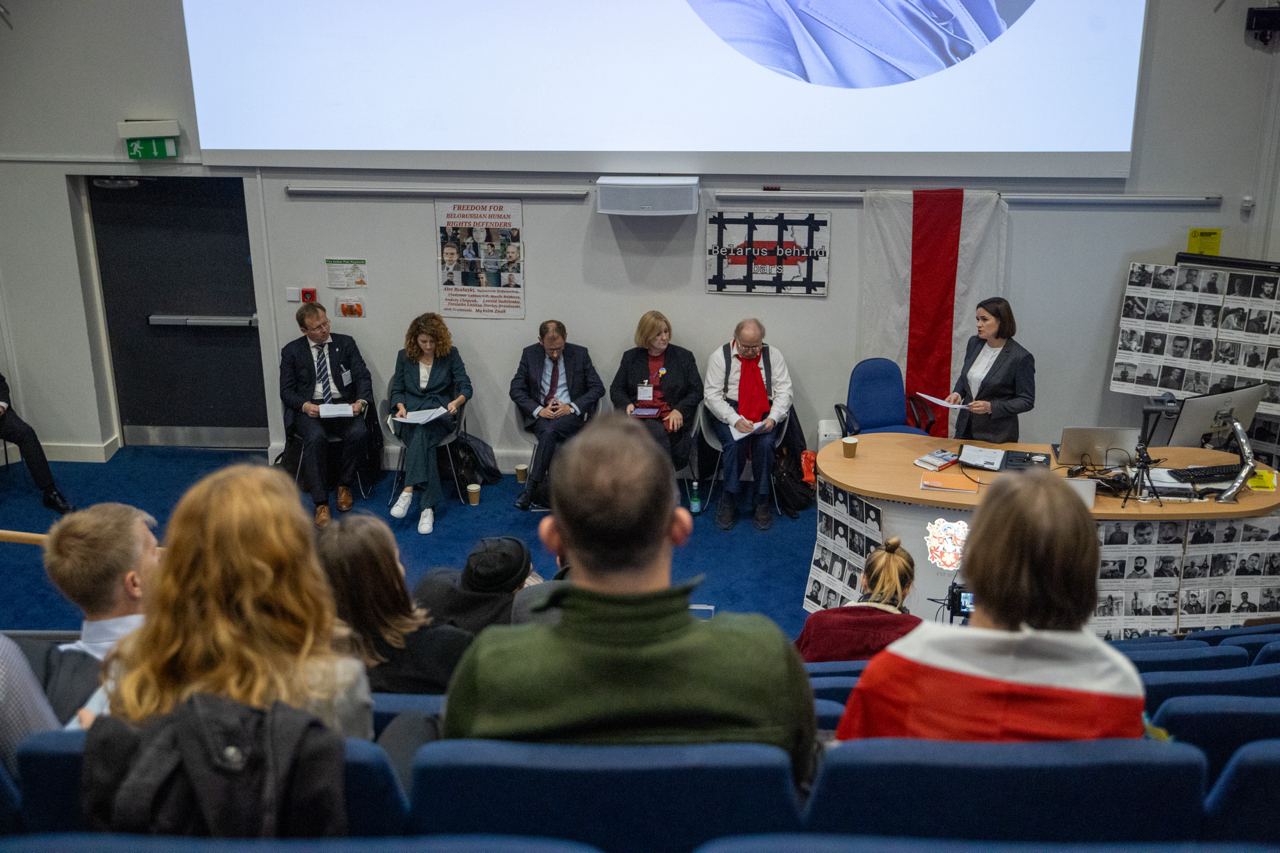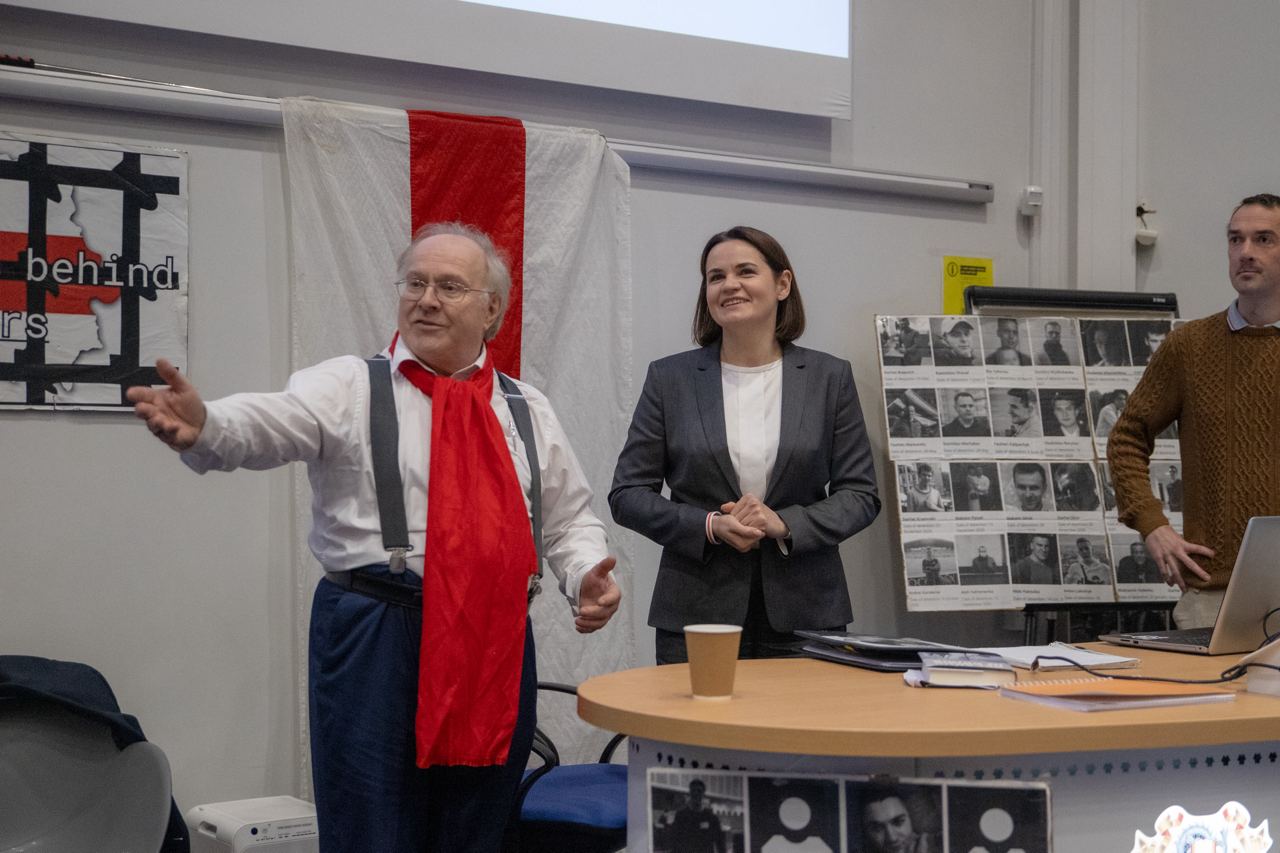Your excellency Ms. Rosemary Thomas,
Dear Professor Flowers,
Dear Mr. Paul Hansbury,
Dear Hanna, dear Ales,
Dear friends,
First of all, thank you very much for organizing this timely and important discussion. I would like to personally thank Professor Alan Flowers and Ales Patrusau.
Also, my warmest gratitude goes to the London South Bank University for hosting the Forum, and especially to Professor Andy Unger, for his heartfelt long-time support of democratic Belarus. Thank you!
I know that the People's Embassy in the UK and the Professional Union of Belarusian in Britain (PUBB) had a very fruitful collaboration with the South Bank University's Human Rights Clinic. In particular, students helped us with compiling the list of legally possible ILO sanctions against the Belarusian regime. We used some of these ideas in correspondence with ILO. It's a great example how Universities can help and support the fight for human rights. Thank you very much!
Here in Great Britain, we really have many friends and allies. Just yesterday I saw the new video by Boris Johnson, in which he supports Belarusian political prisoners. He became a godparent of my husband Siarhei Tsikhanouski. I was really touched. Such public gestures of solidarity mean very much to me and to all Belarusians.
For many years, the United Kingdom, alongside the US and EU, provided enormous support for Belarus's democratic transformation. It substantially invested in our civil society and independent media. Without this support, the national uprising of 2020 would simply not have been possible.
The UK was among the 38 OSCE states that launched the Moscow mechanism for Belarus. The UK supported the creation of the International Accountability Platform to gather evidence of human rights violations in Belarus. I am sure that one day, all these documents will help to restore justice in our country.
However, many things that are being done are not implemented in full. Sanctions don’t work because of loopholes. They are not monitored and enforced. Cases against perpetrators are not been opened. No real investigation of Lukashenka’s crimes has been yet launched. Even generous assistance to independent media is not enough to compete against the massive propaganda machine of Putin and Lukashenka. Unfortunately, many declarations of solidarity remain declarations and are not followed by practical steps.
It seems to me that, neither the UK or other Western democracies have a consistent strategy for Belarus. In contrast to Russia, which clearly knows what it wants from Belarus – to make it a servile, obedient colony.
This Forum provides us with a great chance to explore and test ideas about how to modify the UK policy concerning Belarus and to make it more effective.
I’m going to use the privilege of being the first speaker to point out several ideas, expectations and hopes that we nourish in our hearts and minds.
First, if we want to dismantle the Lukashenka regime and help Ukraine to win the war against Russia, we should start with closing the loopholes in the sanctions. Let me point to the third countries, including from Central Asia and the Middle East, that help Lukashenka and Putin evade the existing restrictions. Even the message that those who assist in circumventing sanctions will face consequences might be effective.
It’s crucial to synchronize sanctions between the EU countries, the US, the UK and other countries. Lukashenka must be sanctioned for repressions against Belarusians, not only for his complicity in the war. We should not forget that political arrests don’t stop for a single day. Though sanctions are not a silver bullet, it is the tool to release people from prisons.
We must not underestimate individual sanctions. Judges and prosecutors, prison chiefs and KGB officers, athletes and oligarchs, propagandists, who support the regime, must be on the sanction list as well, and this list must be regularly updated. For example, propagandists who are under sanctions, are immediately blocked by YouTube, which also helps to fight propaganda.
Sanctions are also a message. When you introduce the sanctions against Russia, the reasoning should include undermining Belarusian sovereignty. Putin must know that his hostile actions towards the Belarusian people will not be forgotten.
Second, we have to bring dictator to account. The very idea of appearing before tribunal is a painful for Lukashenka. If the ICC issues the arrest warrant on Lukashenka, it will affect him a lot. For the deportation of Ukrainian children from occupied territories, but also for crimes against humanity. The International Accountability Platform has already collected enough evidence to open cases against the regime’s cronies in Britain under universal jurisdiction, as Switzerland did a month ago.
Third, we should keep Belarus high on the agenda. Today, it’s overshadowed, primarily by the Israeli-Palestinian conflict. Putin and Lukashenka want to put the world on fire. Therefore, Lukashenka’s propaganda immediately supported Hamas after their blatant attack on Israel. So, no one pays attention to their crimes, deployment of nuclear weapons and de-facto occupation of our country. The UK should use its position to raise the Belarus issue in the G7, but also in the UN Security Council.
Fourth, we need more recognition for democratic Belarus. As we formalize our relations with the EU and the US, we could do the same with the UK. The UK can assign a special envoy to democratic Belarus as it was done by France, Estonia, US, Poland, very soon – Sweden. It would be a strong message to Belarusians inside the country: we stand by you, not the regime.
Fifth, we need our partners in the UK to provide assistance to our democratic forces and civil society. Right now, we have resources to subsist, but not to win. Supporting the repressed and political prisoners, strengthening the capacity of democratic institutions, and countering propaganda is of key importance. Rehabilitation for former political prisoners, internships for Belarusian politicians, scholarships for Belarusian students and scholars, residences for Belarusian artists: all this is possible to organize.
Two months ago, Lukashenka issued another decree depriving Belarusians abroad of legal documents and passports. If they don’t want to return to Belarus. Hundreds of thousands of people can become de-facto stateless. The UK could soften legalization requirements for Belarusians living here.
Also, we plan to issue New Belarusian passports, as the Baltic States were doing here in London during the Soviet Occupation. I hope that the UK is going to be among the countries that will recognize the passport. It will be another important step to delegitimize Lukashenka’s regime.
Dear friends,
Belarusians are eternally grateful to the UK for everything that has been done already. But now, it is a special moment when people’s expectations from the UK and the international community are very high.
I believe that Great Britain can be a champion of Belarusian democracy. Yes, it needs courage. Yes, it needs political will. I am sure that the UK has all of that.
I wish all of us a productive discussion today, to rethink British-Belarusian cooperation in detail.
Zhyve Belarus!









